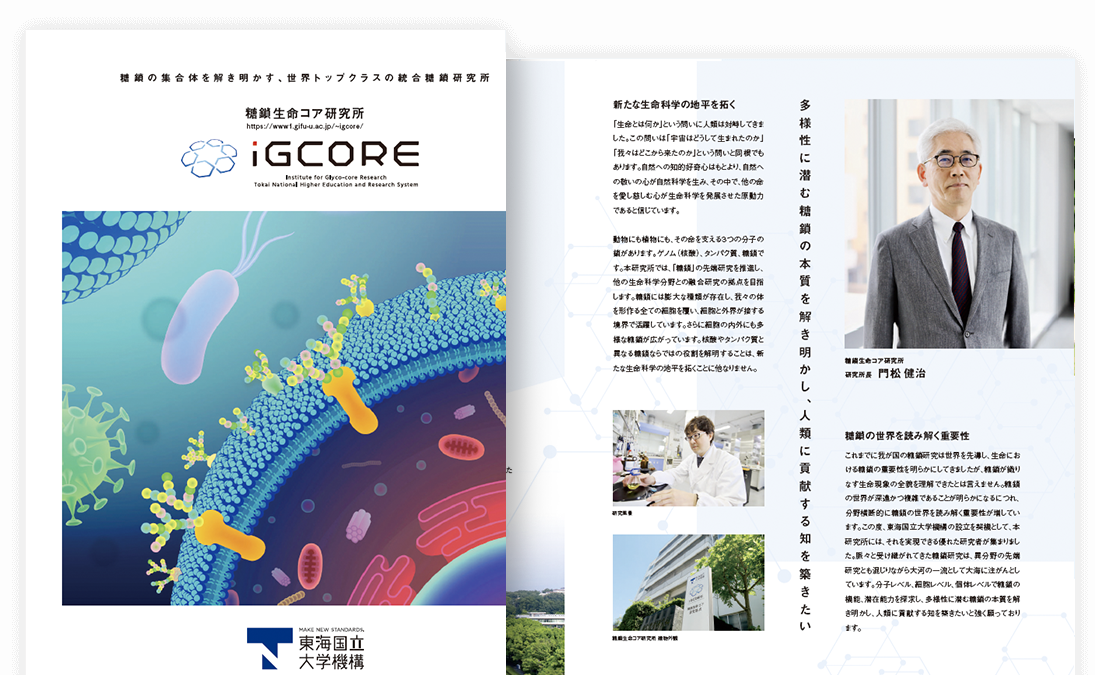RESEARCH
Cooperative Research Facility Division
Purpose / Contents

Support and core facility for glycoscience research
The Cooperative Research Facility Division in the integrated Glyco-Molecular Science Research Center (iGMOL) engages in providing various research tools, equipment, and know-how. For instance, the division offers the generation of gene-engineered mice, microarray analysis, DNA sequencing, and electron microscopic analysis.
Members List
Kaori Tanaka
Division headCooperative Research Facility Division
- Research interests
- Infectious disease, clinical bacteria, anaerobic bacteria
- Research subject
- Our research focuses on the clinical bacteriology of commensal anaerobic bacteria which constitute the major endogenous flora of humans and animals. Endogenous infections involving commensal species are often mixed infections with facultative anaerobes, forming a pathogroup. The major Gram-negative rods tend to be multidrug-resistant and are thought to contribute directly or indirectly to the pathogenesis of the disease, but many aspects of the pathogenesis remain unresolved. This is an obstacle to appropriate clinical testing and chemotherapy. Epidemiologic studies of isolates and these drug resistances are examined, as well as the pathogenic significance of the biased anaerobes.
Haruhisa Suga
Cooperative Research Facility Division
- Research interests
- Pathogenic gene, molecular diagnostics, drug resistance mechanisms, mycotoxins, genetic diversity
- Research subject
- In recent years, food safety, food shortages on a global scale, and the environmental impact of pesticides have become issues. In order to solve these problems, it is important to properly prevent crop diseases, and in particular, a deep understanding of the properties of pathogenic fungi is required. Our laboratory aims to elucidate the molecular mechanisms of pathogenicity, pesticide resistance, and fungal toxin production, and genomic evolution mechanisms in Fusarium fungi, which are major plant pathogens, toxin-producing fungi, and opportunistic infectious pathogens of humans.
Hideki Nikami
Cooperative Research Facility Division
- Research interests
- Animal experiment, animal welfare, developmental engineering, brown fat, sugar metabolism
- Research subject
- Education and development of all aspects of animal experiments (procedures, anesthesia, facility operation, laws and guidelines, animal welfare, etc.). The aim is to develop facility operation methods, animal experiments, and the handling of experimental animals in accordance with international guidelines and national laws.
In addition, we aim to elucidate the sugar metabolism and intracellular mechanisms of obesity and diabetes using genetically modified animals. We particularly focus on brown fat.
Shigeo Takashima
Cooperative Research Facility Division
- Research interests
- Lipids, fatty acids, adrenoleukodystrophy, peroxisome disease, inherited metabolic disease
- Research subject
- Our laboratory studies the functional role of fatty acids in individual development and disease, by investigating a human genetic disease (peroxisome disease) in which fatty acid metabolism is impaired. Fatty acids are one of the important biomolecules, and not only as a material for membranes but also play important physiological roles, such as regulating cellular functions and being used as a source of cellular energy. Our bodies contain more than 100 types of fatty acids in different lengths and shapes. We investigate the significance of the existence of these diverse fatty acids and the mechanisms by which their metabolic changes cause various pathological conditions.
Yuji O. Kamatari
Cooperative Research Facility Division
- Research interests
- Biophysics, structural biology, protein science, molecular interaction analysis, nuclear magnetic resonance spectroscopy (NMR), surface plasmon resonance (SPR), logical drug discovery, neurodegenerative diseases, antibodies, protein expression
- Research subject
- Using various structural biology and biophysical techniques such as NMR and SPR, we analyze the structures and interaction of proteins and glycans to elucidate the biological phenomena they are involved in. Furthermore, we aim to control them for drug discovery.
Takatsugu Goto
Cooperative Research Facility Division
- Research interests
- Anaerobic bacteria, Bacteroides, drug resistance mechanisms, whole genome analysis
- Research subject
- We are engaged in research on drug resistance mechanisms of Bacteroides (especially Bacteroides fragilis), an anaerobic bacterium commensal to the intestinal tract and sometimes isolated from intra-abdominal infection colonies. In particular, we aim to elucidate the mechanism of carbapenem resistance in this species using comprehensive methods such as whole genome analysis
Tomoya Sawamura
Cooperative Research Facility Division
- Research interests
- Colorectal motility, Defecation disorder, Central nervous system, Autonomic nervous system, Descending pain regulatory system, Irritable bowel syndrome, Pathological model animal
- Research subject
- I am studying the mechanism of colorectal motility regulated by the central nervous system and the relationship of this mechanism to defecation disorders. It has been shown that descending pain regulatory system is involved in the central regulation of colorectal motility, so pain modulation and regulation of colorectal motility seem to share a common neural pathway. The aim of this study is to elucidate the pathophysiology of defecation disorders, such as irritable bowel syndrome (IBS), in which abdominal pain and defecation disorders coexist.
Masahiro Hayashi
Cooperative Research Facility Division
- Research interests
- Obligate anaerobic bacteria, phylogenetic classification, infectious disease
- Research subject
- The major focus of our laboratory is on the bacteriology of the obligate anaerobes that comprise the major commensal flora of humans. In recent years, advances in science and technology have led to a restructuring of the bacterial classification system. Our research focuses on drug resistance genes in especially so-called "pathogenic bacteria" that are harmful to humans. We also provide assistance in the identification of bacterial species by genetic approaches to cases from nearby hospitals and other facilities that have difficulty in determining the species of bacteria.
Research Division
Contact us by phone

052-789-5365
( +81-52-789-5365 )
Weekday, 9:00-17:00
Contact us




